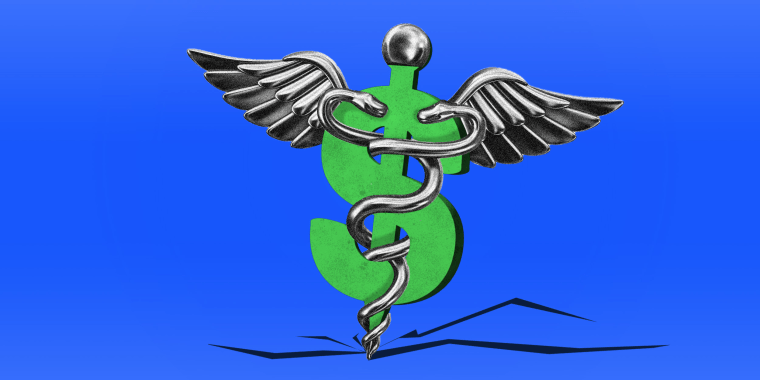The Biden administration last week released a package of steps that will help reduce the burden of medical debt, in concert with the No Surprises Act, a recent bipartisan law that aims to reduce surprise billing — the infamous phenomenon of gigantic out-of-network bills showing up after one has had a medical procedure.
In terms of dealing with the problems of the American health care system, it is pathetically inadequate.
It’s a worthwhile step that will surely help millions of Americans. But in terms of dealing with the problems of the American health care system, it is pathetically inadequate. We still need root-and-branch health care reform, and putting off the day of reckoning is only making the problem worse.
As the National Consumer Law Center’s Jenifer Bosco explained to NPR, there are three main parts of the package. First is the implementation of the No Surprises Act by the Consumer Financial Protection Bureau, which recently published some guidelines to remind medical providers and debt collectors what is no longer allowed, and the Department of Health and Human Services. Second is some debt forgiveness for veterans on the part of the Department of Veteran Affairs, which is still being worked out. The third part includes changes to the credit models used by the Federal Housing Finance Agency to reduce the impact of medical debt on the ability to get a government-insured mortgage.
Some of this is genuinely good stuff. As David Dayen detailed in a recent article in The American Prospect, CFPB head Rohit Chopra has a well-earned reputation for using government power aggressively to protect the citizenry. Chopra himself recently pointed out that a substantial proportion of medical debt is likely illegal: “Our credit reporting system is too often used as a tool to coerce and extort patients into paying medical bills they may not even owe,” he said in a statement introducing a new CFPB report on medical debt.
Illegal medical debt collection has been a problem for years. A great many medical providers behave as de facto extortion rackets, trying to stick sick and vulnerable people (like people who are uninsured) with massive bills, and they are often none too scrupulous with the legal formalities in the process. (Others defraud Medicare and Medicaid, which is less terrible for individuals but still increases overall costs.)
The veteran forgiveness is probably less important, given that there are relatively few veterans and they are less likely to have this kind of debt in the first place thanks to generally good VA care.
We spend about 16.8 percent of GDP on health care — or 5.1 percentage points more than the second-most expensive country, Germany
But the broader health care context is still extremely grim. To start, several important reforms that were part of President Joe Biden’s "Build Back Better" agenda are dead or set to expire now that Sen. Joe Manchin, D-W.Va., blocked the package. As policy analyst Jon Walker explained in The American Prospect, the American Rescue Plan fixed one of the biggest holes in Obamacare by expanding the generosity of subsidies such that nobody on the exchanges would pay more than a modest fraction of their income, thus making affordable coverage theoretically available to all.
But thanks to Manchin, that hole has been reopened, creating for Democrats an October surprise, when millions of Obamacare exchange enrollees are expected to be notified of gigantic premium increases. For a 60-year-old woman making $56,000 per year in West Virginia, for instance, premiums will explode from $93 to $1,500 per month, according to Walker.
Even the No Surprises Act has some holes — most notably that it doesn’t cover ambulance rides, one of the biggest sources of balance bills. Congress can’t even get it together to continue funding free coronavirus vaccinations and tests as the pandemic continues to smolder. Sure enough, uninsured people are now getting slapped with enormous bills for testing.
More broadly, America continues to have the most expensive health care on Earth. According to 2019 numbers (the best data we have on how health care systems work outside of a pandemic), we spend about 16.8 percent of GDP on health care — or 5.1 percentage points more than the second-most expensive country, Germany. If Americans spent what Germans do on health care, we would save something like $1.1 trillion annually. If we count premium payments as taxes — which they arguably are, since they are de facto mandatory — then American workers are the second-most highly taxed in the world.
Our health care is so expensive that just our tax funding for Medicare, Medicaid, Children’s Health Insurance Program, the VA and other government programs would be enough to fund universal Medicare in a peer country. Indeed, if we transplanted Canada’s "Medicare for All" system into the U.S., taxes would actually go down.
And for all that in spending, we have mediocre to terrible health outcomes to show for it. Our rate of survival for cancers and strokes is decent, but we have the worst life expectancy among rich countries, at about five to six years behind leaders like Japan and Norway. Our infant mortality rate is five times that of Iceland, and our maternal mortality rate is nearly 11 times that of Denmark.
America is not a country that needs a little tinkering with its billing practices, as welcome as reforms are in the abstract. The fact that even Biden’s modest steps couldn’t survive thanks to his own party members does not speak well of the capacity of the American political system to ever deal with the fact that health care is eating the U.S. economy from the inside.
